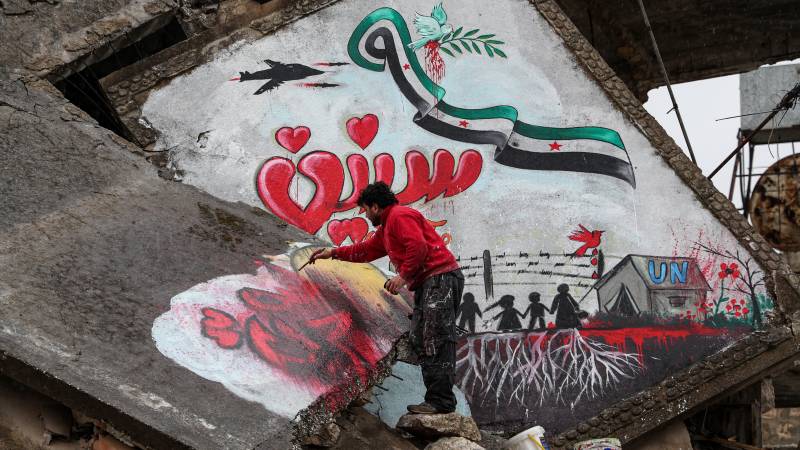Syria's brutal war enters 10th year

Stay tuned with 24 News HD Android App

Syria's brutal conflict enters its 10th year Sunday with President Bashar al-Assad's regime consolidating its hold over a war-wracked country with a decimated economy where foreign powers flex their muscle.
When Syrians took to the streets on March 15, 2011, they could scarcely have imagined their anti-government protests would turn into a complex war entangling rebels, jihadists and outside forces.
At least 384,000 people have since died, including more than 116,000 civilians, the Syrian Observatory for Human Rights war monitor said Saturday.
The conflict has displaced more than 11 million people internally and abroad.
"Nine years of revolution illustrate the extent of the suffering we have known, between exile, bombings and deaths," said Hala Ibrahim, a rights activist who now lives in the town of Dana, in Idlib province.
"I left my university, my house which was bombed," the woman in her 30s said. "We've lost everything."
Originally from the northern city of Aleppo, Ibrahim left in late 2016 after the regime retook rebel-held areas and she sought refuge in Idlib.
The northwestern region -- Syria's last rebel stronghold -- is the regime's latest target.
Thanks to the military support of Russia, Iran and Lebanese militant group Hezbollah, Assad has clawed back control of over 70 percent of the war-torn country.
A fragile ceasefire came into effect in the northwest earlier this month, and Turkish and Russian officials have agreed to start joint patrols in Idlib.
Syrian forces and Russian warplanes have heavily bombarded the region since December, killing nearly 500 civilians, the Observatory says, and forcing nearly a million to flee, according to the United Nations.
'Ruin and misery'
Siham Abs and seven of her children have been living for the past two months in a camp for Idlib's displaced near Bardaqli, not far from the Turkish border.
Many of those unable to find space in camps have been sleeping in fields or have sought shelter in schools, mosques and unfinished buildings.
In the Bardaqli camp, tents made of plastic sheeting are lined up along muddy paths.
Abs said she and her family would like to wash, but don't know where. "I am 50 years old and I've never known such difficult times," she said.
The UN special envoy for Syria, Geir Pedersen, said on the eve of the anniversary: "The suffering of the Syrian people during this tragic and terrible decade still defies comprehension and belief."
The Syrian conflict was born of unprecedented anti-government demonstrations in the southern city of Daraa nine years ago.
Protests spread across Syria, but a violent crackdown soon saw rebels take up arms with backing from Gulf nations and wrest key areas from government control.
Jihadist groups also emerged, notably the Islamic State group which swept across large parts of the country and neighbouring Iraq in 2014.
"A decade of fighting has brought nothing but ruin and misery," UN Secretary-General Antonio Guterres wrote this week on Twitter.
"There is no military solution. Now it is the time to give diplomacy a chance to work."
But in recent years, such efforts have failed.
Five foreign powers operate in Syria, with Russia and Iranian forces supporting the regime.
Despite an announced withdrawal of US forces last year, American troops are still stationed in the country's northeast, in a semi-autonomous Kurdish zone.
After the fight against IS, Washington's main objective has turned to curbing Iranian influence.
'$400 billion in destruction'
Israel regularly carries out air strikes on Syrian, Hezbollah and Iranian military positions.
And neighbouring Turkey, which supports local armed groups, has deployed its troops across the border.
"The horrific and enduring nature of the conflict is proof of a collective failure of diplomacy," Pedersen said.
The war has ravaged Syria's economy and infrastructure.
The United Nations estimated in 2018 that the conflict had caused nearly $400 billion in war-related destruction.
"Basic services, hospitals and schools need to be rebuilt" across the country, the International Committee of the Red Cross said Saturday.
"Houses and land need to be cleared of unexploded ammunition. Jobs and other sources of income need to be created and maintained."
